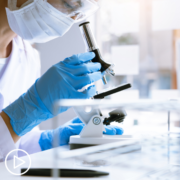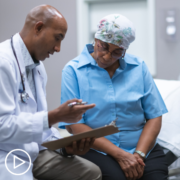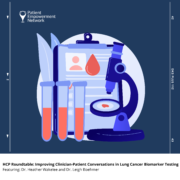What Is the Role of Biomarker Testing in Stomach Cancer?
What Is the Role of Biomarker Testing in Stomach Cancer? from Patient Empowerment Network on Vimeo.
What’s the current status of biomarker testing in gastric cancer? Expert Dr. Joo Ha Hwang from Stanford Medicine shares an update about biomarker testing in gastric cancer research, H. pylori infection testing, and proactive patient advice about H. pylori and potential symptoms.
[ACT]IVATION Tip
“…go to your doctor, especially if you come from an area, or your parents come from an area that has high prevalence of H. pylori, which is pretty much anywhere in the world besides the United States, then you should talk to your doctor about getting H. pylori testing, especially if you have any abdominal pain symptoms or changes in appetite.”
See More from [ACT]IVATED Gastric Cancer
Related Resources:

|

|

|
Transcript:
Lisa Hatfield:
Dr. Hwang, can you speak to the role biomarker testing plays in gastric cancer? And what key information should patients know about early detection as it relates to biomarker testing?
Dr. Joo Ha Hwang:
So, currently there are no good biomarkers to detect gastric cancer at an early stage. So there’s a lot of investigation going on. Unfortunately, up to this point, gastric cancer research has been woefully underfunded on a national level. Most gastric cancer research has been funded by foundations and smaller interests. The NIH up until now has not put a lot of money into gastric cancer. Fortunately, we see this environment changing, and there’s an increasing interest at the NIH to fund gastric cancer research.
But that’s where identification of biomarkers comes from. There are companies out there that are looking at like circulating tumor DNA and other biomarkers. Again, I would say that there are very preliminary. And so I wouldn’t at this point recommend having these tests done because they’re so preliminary.
The one thing that I wouldn’t call a traditional biomarker, but is something that really increases your risk would be the presence of H. pylori infection. And so you can be tested for H. pylori infection by, there’s serum testing, there’s breath testing, you can get it on endoscopy, or the most common way is a stool antigen to test to see if you had H. pylori. The reason that that’s important is H. pylori is considered the number one cause of chronic gastric inflammation that then leads to gastric cancer.
And so the WHO has classified this as a class one carcinogen. And if you do have H. pylori, you should definitely get that treated. And depending on your age and how long you’ve had H. pylori infection, you should probably have endoscopy if you’re over the age of 40 to determine whether or not there’s any changes in the lining of your stomach that would increase your risk for developing gastric cancer.
So, my activation tip for this would be go to your doctor, especially if you come from an area, or your parents come from an area that has high prevalence of H. pylori, which is pretty much anywhere in the world besides the United States, then you should talk to your doctor about getting H. pylori testing, especially if you have any abdominal pain symptoms or changes in appetite.










